Related Research Articles

The Alliance of Liberals and Democrats for Europe Party is a European political party composed of 60 national-level liberal parties from across Europe, mainly active in the European Union. The ALDE Party is affiliated with the Liberal International and a recognised European political party, incorporated as a non-profit association under Belgian law.

Congresses are formal meetings of the representatives of different countries, constituent states, organizations, trade unions, political parties, or other groups. The term originated in Late Middle English to denote an encounter during battle, from the Latin congressus.

Leopold I was the first King of the Belgians, reigning from 21 July 1831 until his death in 1865.
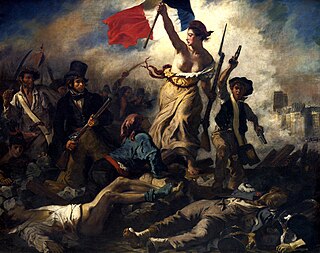
The French Revolution of 1830, also known as the July Revolution, Second French Revolution or Trois Glorieuses in French, was a second French Revolution after the First, that of 1789. It led to the overthrow of King Charles X, the French Bourbon monarch, and the ascent of his cousin Louis Philippe, Duke of Orléans, who himself, after 18 precarious years on the throne, would be overthrown in 1848. It marked the shift from one constitutional monarchy, under the restored House of Bourbon, to another, the July Monarchy; the transition of power from the House of Bourbon to its cadet branch, the House of Orléans; and the replacement of the principle of hereditary right by that of popular sovereignty. Supporters of the Bourbon would be called Legitimists, and supporters of Louis Philippe Orléanists.
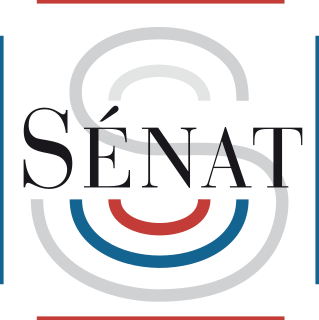
The Senate is the upper house of the French Parliament, which, along with the National Assembly—the lower chamber—constitutes the legislature of France. It is made up of 348 senators elected by part of the country's local councillors, as well as by representatives of French citizens living abroad. Senators have six-year terms, with half of the seats up for election every three years.

The Belgian Revolution was the conflict which led to the secession of the southern provinces from the United Kingdom of the Netherlands and the establishment of an independent Kingdom of Belgium.

The Senate is one of the two chambers of the bicameral Federal Parliament of Belgium, the other being the House of Representatives. It is considered to be the "upper house" of the Federal Parliament. Created in 1831 as a chamber fully equal to the Chamber of Representatives, it has undergone several reforms in the past, most notably in 1993 and 2014. The 2014 elections were the first without a direct election of senators. Instead, the new Senate is composed of members of community and regional parliaments and co-opted members. It is a chamber of the communities and regions and serves as a platform for discussion and reflection about matters between these federated entities. The Senate today plays a minor role in the federal legislative process. However, the Senate, together with the Chamber, has full competence for the Constitution and legislation on the organization and functioning of the Federal State and the federated entities. Since the reform of 2014, it holds about ten plenary sessions a year.
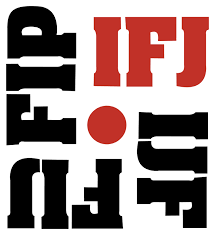
The International Federation of Journalists (IFJ) is a global union federation of journalists' trade unions—the largest in the world. It represents more than 600 000 media workers from 187 organisations in 146 countries.

Belgians are people identified with the Kingdom of Belgium, a federal state in Western Europe. As Belgium is a multinational state, this connection may be residential, legal, historical, or cultural rather than ethnic. The majority of Belgians, however, belong to two distinct ethnic groups or communities native to the country, i.e. its historical regions: Flemings in Flanders, who speak Dutch, and Walloons in Wallonia, who speak French or Walloon. There is also a substantial Belgian diaspora, which has settled primarily in the United States, Canada, France, and the Netherlands.

Jean Baptiste Julien d'Omalius d'Halloy was a Belgian geologist. He also wrote on races.
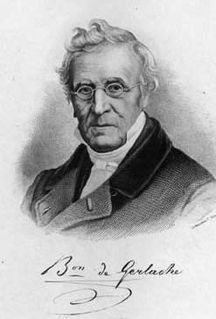
Étienne Constantin, Baron de Gerlache was a lawyer and politician in the United Kingdom of the Netherlands, and later became in 1831 the first Prime Minister of the newly founded Belgian state.

Charles Latour Rogier was a Belgian liberal statesman and a leader in the Belgian Revolution of 1830. He became Prime Minister of Belgium on two occasions: from 1847 to 1852, and again from 1857 to 1868.

The Constitution of Belgium dates back to 1831. Since then Belgium has been a parliamentary monarchy that applies the principles of ministerial responsibility for the government policy and the Trias Politica. The Constitution established Belgium as a centralised, unitary state. However, since 1970, through successive state reforms, Belgium has gradually evolved into a federal state.
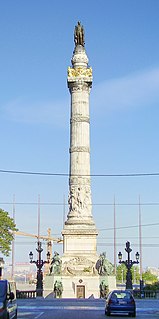
The National Congress was a temporary legislative assembly in Belgium, convened in 1830 in the aftermath of the Belgian Revolution. Its purpose was to devise a national constitution for the new state, whose independence had been proclaimed on 4 October 1830 by the self-declared Provisional Government.

Philippe Félix Balthasar Otto Ghislain, Count de Merode, known as Félix de Merode, was a Belgian politician.

The Provisional Government was formed as a revolutionary committee of notables during the Belgian Revolution on 24 September 1830 at the Brussels City Hall under the name of Administrative Commission.
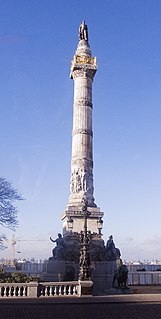
The Congress Column is a monumental column in Brussels, Belgium, which commemorates the creation of the Belgian Constitution by the National Congress of 1830–31. Inspired by Trajan's Column in Rome, it was erected between 1850 and 1859, on the initiative of Charles Rogier according to a design by Joseph Poelaert. At the top of the column is a statue of Belgium's first monarch; King Leopold I, and at its base, the pedestal is surrounded by statues personifying the four freedoms guaranteed under the Constitution. The Belgian Tomb of the Unknown Soldier with an eternal flame lies at its foot.

Count Charles Aimé Joseph Le Hon was a Belgian liberal politician.

Elections to the temporary National Congress were held in Belgium on 3 November 1830, following the declaration of independence from the Netherlands. The elections were held using a modified form of the Dutch system, as defined by the Orders of the Provisional Government of 10 October and 12 October 1830. 200 members were elected by plurality in constituencies of varying sizes, and suffrage was restricted to taxpaying men over the age of 25, with a higher tax threshold in urban areas than rural ones. Although clergy and academics were exempt from the restrictions, only around 1% of the country's population was eligible to vote.
Events in the year 1830 in Belgium.
References
- "Membres du Congrès national" (in French). unionisme.be. Retrieved 4 April 2010.